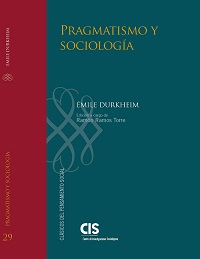
Pragmatism and Sociology
Émile Durkheim. Ramón Ramos (Ed. and translator)
255
Madrid, 11/27/24
ISBN: 9788474769425
Descripción
Between January 1913 and May 1914, Durkheim taught a course on Pragmatism and Sociology at the Sorbonne. It would be one of his last academic courses: the great catastrophe of the First World War and his untimely death in 1917 brought to a close his fruitful cycle of dedication to university teaching, which he had begun in Bordeaux in 1887. Durkheim had the habit of writing up the courses he taught, which has made it possible to publish many of them. For unknown reasons, the text of this course was lost. Its content has been reconstructed thanks to the notes taken by some of the class attendees. This edition includes the reconstruction of these notes, which Armand Cuvillier made for the first edition of the book in 1955. The main text is supplemented by other more recent sources and some of Durkheim's minor writings that are relevant to a more complete reconstruction of his ideas.
The course focuses on the study and critique of American pragmatism, with special attention to the work of William James. Although Durkheim asserted that the distance between pragmatism and his sociology was vast and there was no room for confusion, in reality he—both he and his disciples and followers—found significant lines of continuity and convergence that, in his view, deserved to be clarified to avoid errors. Hence, his critical reflections on pragmatism are so relevant to understanding his sociology. Consequently, the relevance of this work by Durkheim's late work is twofold: it allows for a deeper understanding of the entire body of work of a classic of sociology, but it also invites a reconsideration, charged with topicality, of the complex relationships that have been forged between pragmatism and sociology since its origins. We know that, at the beginning of the 20th century in France, pragmatism aroused a keen interest in the nascent social sciences, and it is evident that today, a century later, that interest appears renewed throughout the world. Hence the relevance of a text whose relevance increases with the passage of time.
